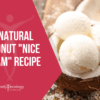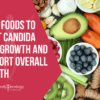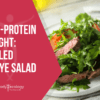Hidden Sugars and the Future of GMO Sugar
According to a United States judge in New York, even “reasonable consumers may not read the nutritional label” before buying a new product. (1)
As a lawsuit against Coca-Cola’s Vitaminwater proves, if you don’t read the labels—or if you don’t know how to decipher them—you run the risk of jeopardizing your health goals.
This is especially true when it comes to sugar.
For example, depending on the manufacturer, you will find that some forms of sugar are more processed and refined than others. Then there is GMO sugar, which comes from genetically modified plants—usually beets.
Depending on where you are in your journey toward better health, you might consume small amounts of organic, unrefined sugar. Or—if you are cleansing toxins and fighting Candida overgrowth—you may do your best to avoid sugar entirely.
We suggest that you steer clear of any added sweeteners—whether they are organic or GMO, refined or raw.
Healthy Drinks That Aren’t So Healthy

Have you ever taken the time to check how much sugar is really hiding in your food? If you’re trying to cut out sugar to cleanse or fight Candida, seemingly healthy foods could interfere with your success.
This past July, a judge recommended that four plaintiffs take their case against Coca-Cola to court as a class action—which is another way of saying that they gather a large group of people and bring the case to court.
Coca-Cola advertises their Vitaminwater as a “nutrient enhanced water beverage.”
They use slogans like, “vitamins + water = all you need” and “vitamins + water = what’s in your hand.” These slogans give the illusion that Vitaminwater is just water with added nutrients, which would make it a healthy alternative to soft drinks.
But Vitaminwater doesn’t advertise that many of their drinks contain up to 32 grams of sugar—almost as much as a can of Coke!
Vitaminwater contains two forms of sugar:
- Cane sugar
- Crystalline fructose
Crystalline fructose is almost entirely fructose. Most often, it is made from cornstarch—or corn. But sometimes other starches like wheat or rice are used to make crystalline fructose. And because crystalline fructose is 20% sweeter than table sugar and 5% sweeter than high fructose corn syrup, you save calories when you use it.
Fructose is a sugar that is largely processed by the liver. This means that excessive amounts of fructose can cause problems for your body’s number one detoxification organ. Problems like fatty liver disease and cirrhosis. (2)(3)
In fact, the FDA has not even given crystalline fructose its GRAS (generally recognized as safe) stamp of approval.
Watch Out for GMO Sugar
What about the cane sugar in Vitaminwater and other “healthy” drinks?
Monsanto—the big name company that leads the production of genetically engineered seed—is on its way to refining insect-protected and roundup ready sugarcane. In the future, this can mean widespread production of GMO sugar cane that is unnaturally resistant to bugs and tolerant to herbicide.
Monsanto’s GMO sugar beets have taken the agricultural business by storm. Even the USDA has decided that roundup ready sugar beets are as safe as traditionally bred sugar beets. The USDA has also decided that roundup ready sugar beets require no regulation.
Sugar that comes from roundup ready sugar beets, cane sugar, or a mix of the two requires no definite label. It’s all up to the manufacturer—and their marketing angle.
The best way to avoid GMO sugar is to choose organic sugar or not eat it at all. In order to get the organic label, crops cannot contain bioengineered genes.
If you still crave a little touch of sweet, we suggest a safe, natural sugar-free sweetener like Stevia or lakanto.
What To Remember Most About This Article:
If you don’t take the time to read or don’t know how to interpret product labels, you could be sabotaging your health goals without even knowing it.
If you are in the process of cleansing to fight Candida, you may be trying to avoid sugar altogether. But as we learned from a recent class action lawsuit against the producer of Vitaminwater, Coca-Cola, product labels may not always be what they seem. Vitaminwater is advertised as a healthy alternative to soft drinks when it actually contains up to 32 grams of sugar!
Other so-called healthy labels may contain GMO sugar in the near future that won’t require regulation from the USDA. It will be up to the manufacturer whether or not they disclose the type of sugar in their product.
To avoid this danger altogether, we strongly recommend seeking out organic sugar or cutting out sugar completely. You can continue to enjoy a sweet taste with safe, natural sugar-free sweeteners like Stevia and lakanto – that won’t affect your health for the worse.
- [product id=”37″]
- [product id=”125″]
REFERENCES:
- http://cspinet.org/new/pdf/decision_on_certification_doc_143.pdf. Retrieved 08-18-13.
- Ouyang, X., Cirillo, P., Sautin, Y., McCall, S., Bruchette, J. L., Diehl, A. M., … & Abdelmalek, M. F. (2008). Fructose consumption as a risk factor for non-alcoholic fatty liver disease. Journal of hepatology, 48(6), 993-999.
- Kohli, R., Kirby, M., Xanthakos, S. A., Softic, S., Feldstein, A. E., Saxena, V., … & Seeley, R. J. (2010). High‐fructose, medium chain trans fat diet induces liver fibrosis and elevates plasma coenzyme Q9 in a novel murine model of obesity and nonalcoholic steatohepatitis. Hepatology, 52(3), 934-944.








